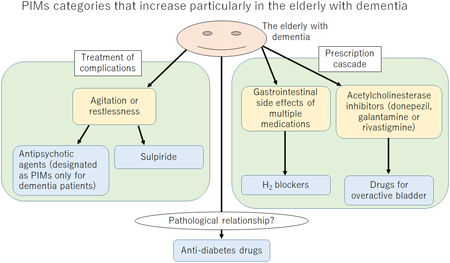- 著者
- Yoshihito Kasanami Takashi Yamamoto Tomoyoshi Miyamoto Sumio Matzno Mikio Sakakibara Masahiro Iwaki Atsufumi Kawabata
- 出版者
- The Pharmaceutical Society of Japan
- 雑誌
- Biological and Pharmaceutical Bulletin (ISSN:09186158)
- 巻号頁・発行日
- vol.46, no.12, pp.1699-1705, 2023-12-01 (Released:2023-12-01)
- 参考文献数
- 34
Community pharmacists may play a key role in promoting deprescribing of potential inappropriate medications (PIMs) that are highly prevalent among community-dwelling elderly with dementia. To characterize PIMs categories that need a special attention for dementia patients, in the present study, we analyzed the anonymized pharmacy claims data of patients aged 65 years and older (n = 333869) who visited nationwide 905 community-based pharmacies of Sugi Pharmacy Co., Ltd. during December 1–31, 2019. A dementia group was defined as patients who received typical dementia medications marketed in Japan, i.e., donepezil, galantamine, memantine or rivastigmine, and a non-dementia group was defined as patients who received no such medications. After propensity score matching on the basis of patients’ age, gender and home healthcare insurance usage, the data of 11486 patients in each group were subjected to logistic regression analyses, to identify PIMs categories particularly important for dementia patients. Univariate analysis indicated that the proportions of dementia patients who received 1 and 2≤ of PIMs were significantly (p < 0.001) greater than those of non-dementia patients (odds ratios were 1.35 and 1.47, respectively). Multivariate analyses identified 5 categories of PIMs that were significantly more frequently prescribed in dementia patients, i.e., ‘H2 blockers,’ ‘drugs for overactive bladder,’ ‘anti-diabetes drugs’ and ‘sulpiride’ listed as PIMs categories for non-specific cases (adjusted odds ratios (aORs): 1.29, 1.91, 1.17, and 1.38, respectively), in addition to ‘antipsychotics’ listed only for dementia patients (aOR: 4.29). These results provide useful information to establish strategies for pharmacist-led deprescribing of PIMs in dementia patients.
